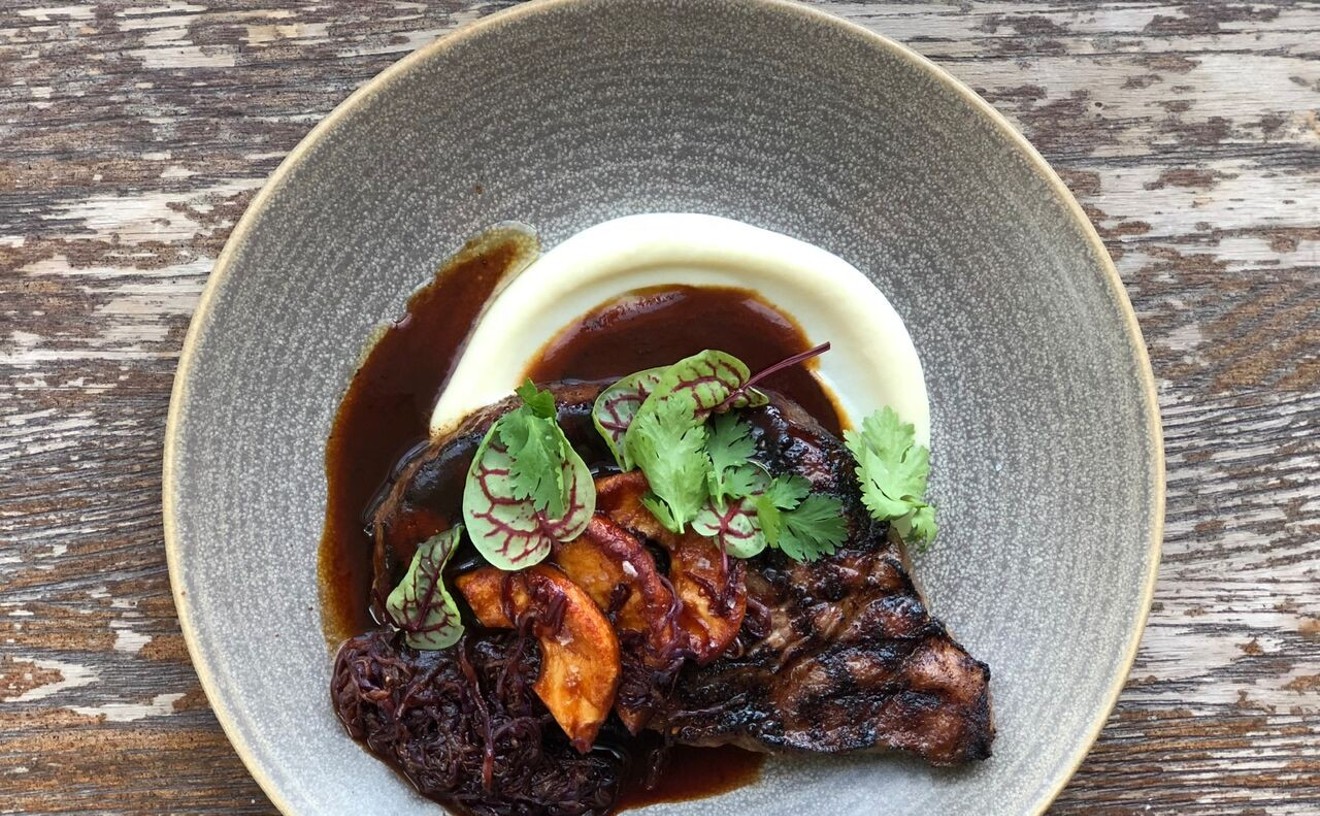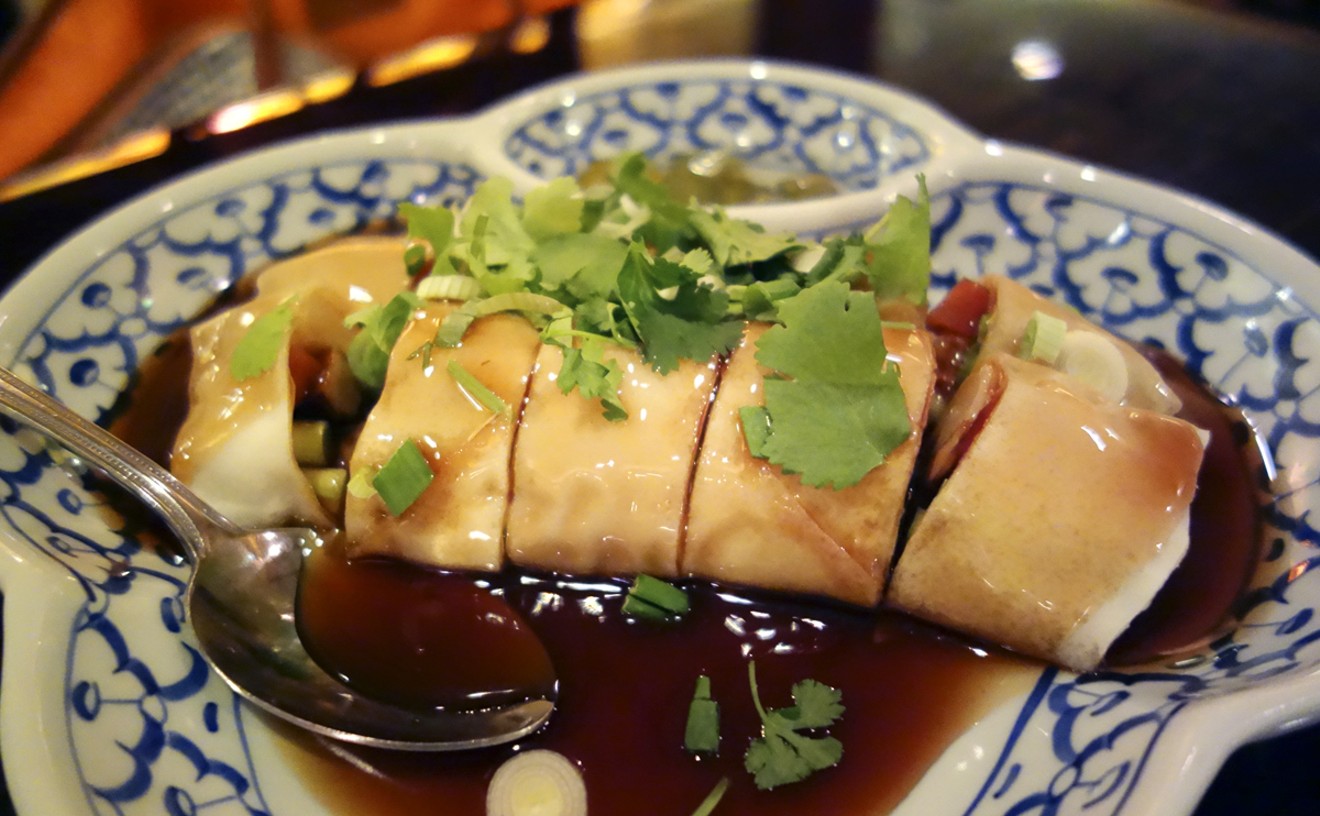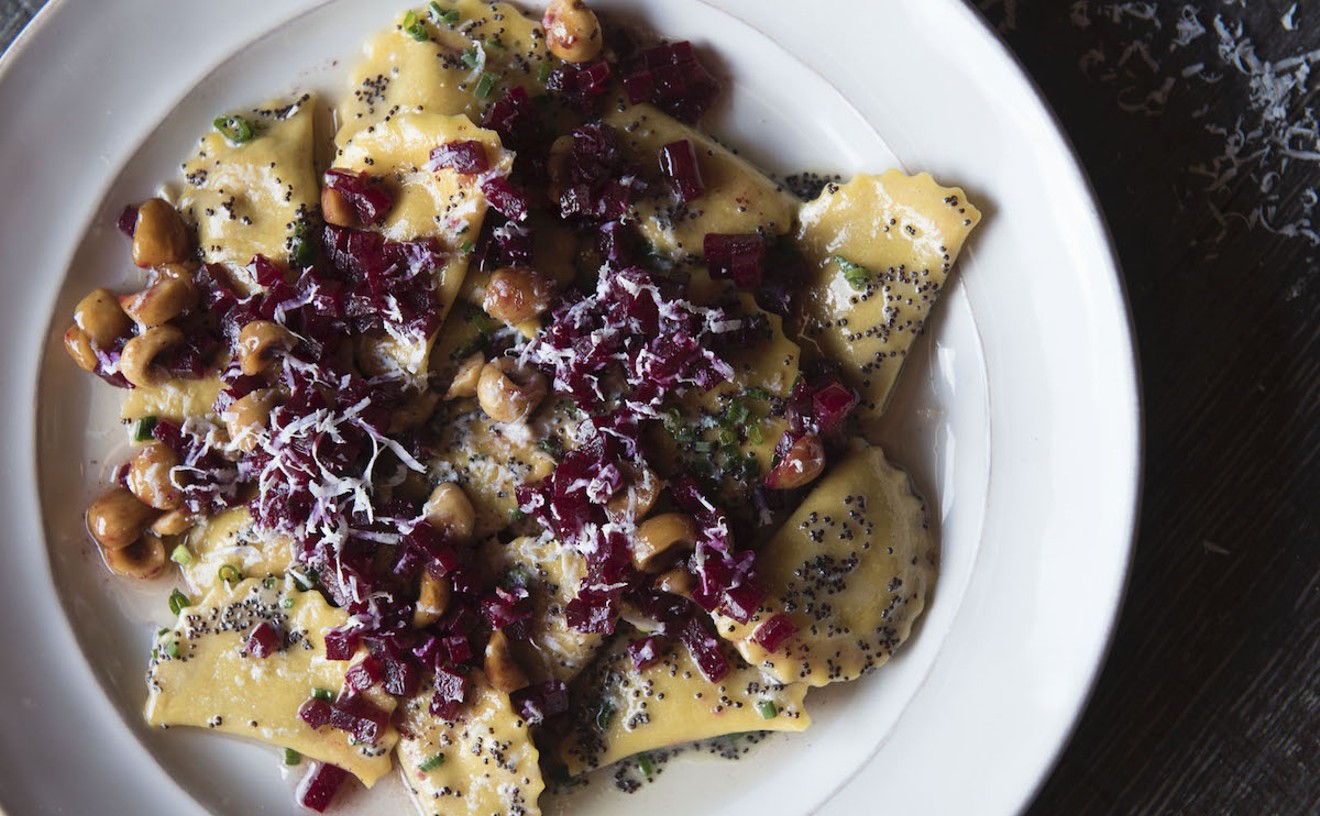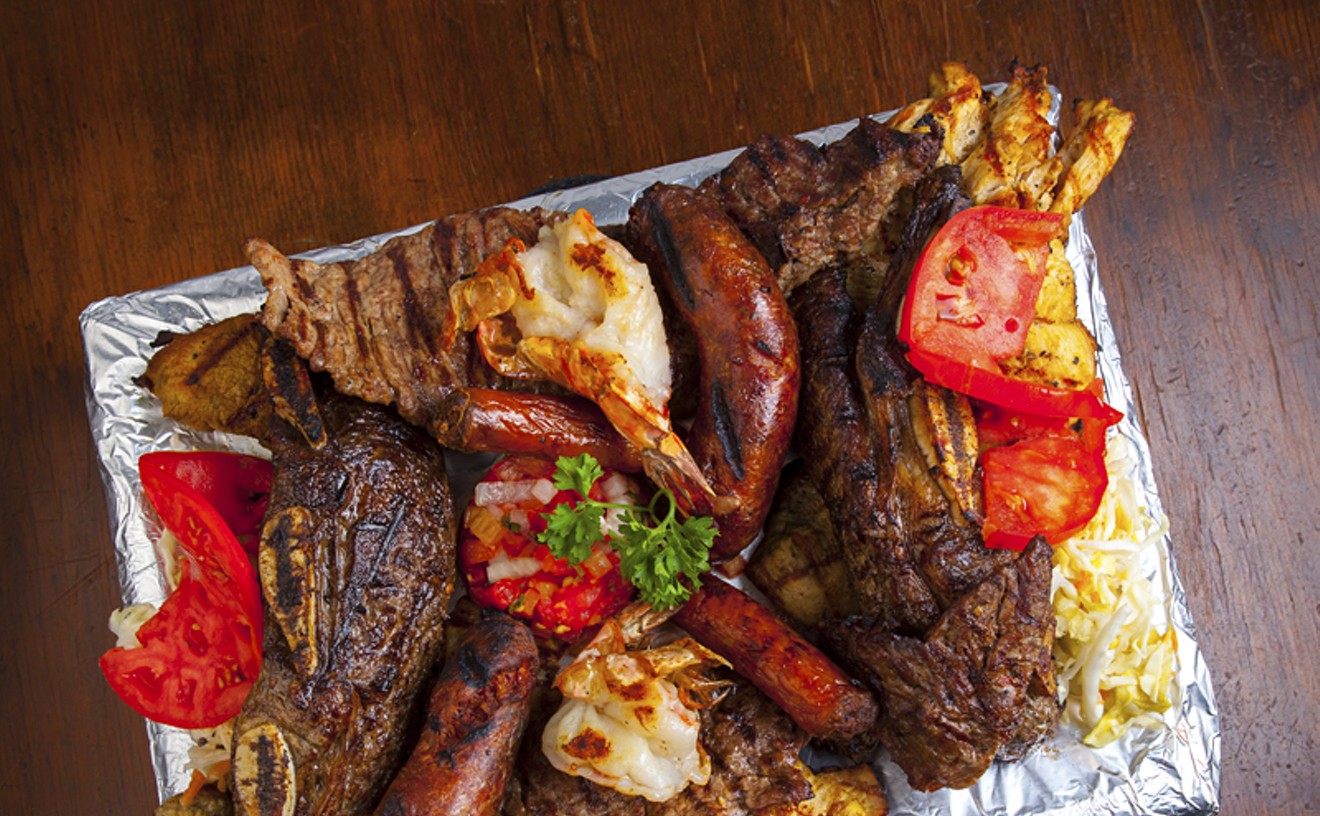Edge is everything that every restaurant in Miami should be. Chef Aaron Brooks and his crack team turn out dozens of thick, fantastically bloody steaks each day and do so without the pretense or price of most places. Don't miss the Wagyu New York strip ($30) or the grass-fed rib eye ($55). Your server will offer you a house-made steak sauce. We're not talking A1. We're talking beef jus fattened up with Malbec, a three-peppercorn sauce that can put any au poivre to shame, or a house chimichurri. Get them all. But don't stop there. Edge isn't just a steakhouse. Plump lobster slicked with kohlrabi rémoulade ($17) makes this fine establishment feel like a seafood shack (but one in the Four Seasons), while the spiced lamb sausage called merguez ($10), served with sesame yogurt and marinated turnips, seems straight off the streets of North Africa. The point isn't even how alluring the food is. It's that Edge's kitchen executes dishes with a level of style, service, and culinary ingenuity that should make any restaurant, in a hotel or otherwise, aspire to do better.
Best Restaurant in Brickell
Edge Steak & Bar

- 1435 Brickell Ave., Miami, 33131 Map
- 305-381-3190
- edgerestaurantmiami.com
Best Restaurant in Little Havana
El Atlacatl
No table at this beloved Salvadoran spot should go without chef and owner Napoleon Moreno's sopa de res ($4.95/$6.95). Mondays and Fridays, the kitchen turns out this intensely beefy bright-yellow soup packed with hunks of carrot and potato and rich knots of tender beef. On Tuesdays, it's the sopa de gallina ($4.95/$6.95), in which an old hen is magically transformed into a tender, succulent delight. It's work Moreno and his family have done for decades, earning the adulation of the surrounding community and cementing El Atlacatl's position as one of the neighborhood's favorite restaurants. Don't miss the pupusas ($2.75), made of thick cornmeal patties encasing a luscious blend of salty cheese and the spice mixture called Pipil, named for indigenous tribes of the region; this is a potent combination of annatto, clove, allspice, and black pepper. Two of the savory corn rounds work well any time of day, and don't be surprised if you find yourself back later for seconds.
- 466 SW 17th Ave., Miami, 33135 Map
- 305-631-0103
- www.miamielatlacatl.com
Best Restaurant in South Miami-Dade
Teixeira Portugal Restaurant

Behold, the house that bacalhau built! Did you know Portugal conquered the world thanks to the stiff milky-white cod fillets preserved in salt? Better known as bacalhau to Portuguese-speakers, the stuff has a whole page of the menu dedicated to it at the white-tablecloth Teixeira Portugal Restaurant. The kitchen grills, shreds, boils, fries, and stews the fish that's also called "fiel amigo" (loyal friend) into a bounty of dishes. For the bacalhau com natas ($22.99), the cod is shredded into shards with onions and potatoes and then whipped into a rich cream sauce fortified with garlic and topped with a white cheese that's melted until it forms a crisp brown shell. Teixeira isn't open for breakfast, but its bacalhau a bras ($20.99) is well suited for mornings. Supple shreds of the fish are scrambled into eggs, crisp potato strands, and sweet sautéed onions. Try the bacalao northern-style ($24.99), in which the fish is deep-fried, lathered in a creamy pumpkin-hued garlic sauce, and sandwiched between two heaps of mashed potatoes. Had enough yet? Of course not. Now you're ready to hop a ship and sail the seas with nothing other than the wind and bacalao fueling the voyage.
Readers' choice: Chef Adrianne's Vineyard Restaurant & Wine Bar
- 1569 Sunset Dr., South Miami, 33143 Map
- 786-717-6749
- teixeiraportugal.com
Best Restaurant in Hollywood
Sardelli

"When you're here, you're family," was once Olive Garden's very catchy slogan. That catch phrase also applies to Sardelli's, a significantly more upscale Italian steakhouse in Hollywood. Whether it's your first or 100th time coming here for dinner, the staff will treat you like a regular. Contributing to this convivial atmosphere is the fact you're eating in a four-story house that underwent a $3 million renovation five years ago and is now both cozy and contemporary. What's more, the eatery is a family-run business, and owner Fulvio Sardelli Jr. is also the chef. How nice not to have to decide between pasta and steak. At Sardelli's, it's practically a must to order one of each. Get the cavatelli with braised veal shank in a truffle-butter-and-veal broth ($16 for a half-portion or $32 for full) as your primo, and order a USDA Prime certified Black Angus eight-ounce filet mignon for your secondo ($36). Another one of Sardelli's hits is the fried calamari in a delicious spicy tomato sauce ($15). There's nothing pretentious here, only homestyle cuisine in the most inviting of settings. Sardelli is open Monday through Saturday from 5 to 11 p.m. and Sunday from 5 to 10 p.m.
Readers' choice: Point Royal
- 331 Van Buren St., Hollywood, 33019 Map
- 954-921-8331
- sardellis.com
Best Restaurant in Hallandale Beach
Screaming Carrots

Screaming Carrots is all about organic, plant-based cuisine, the type of food that's meant to nourish the mind, body, and soul. If you're skeptical of this place because of its name, don't be. The food is so tastefully composed it won't matter if you're a vegan, meat-eater, or pescatarian. It's all thanks to chef/owner Guy Braverman, just an average joe who began living a 100 percent plant-based lifestyle three years ago to boost his health. After plenty of trial and error, Screaming Carrots now offers customers many of his favorite organic, whole-food, plant-based recipes. Open from 10 a.m. to 8 p.m. Sunday through Thursday and till 9 p.m. Friday and Saturday, the restaurant allows you to start your day with steel-cut oatmeal or a tofu scramble ($12): organic sprouted tofu griddled and tossed with baby spinach and mushrooms, topped with pine nuts, and served with a salad, house-made bread, and jam. For lunch, go for a bowl of Braverman's mushroom and coconut soup ($9): portobellos simmered in a fragrant coconut milk broth with peppers, onion, and cilantro, topped with a spoonful of coconut cream, and served with an optional side of rice. Meat-eaters will love the house schnitzel ($12): a savory soy-and-wheat-breaded tofu patty stuffed between two slices of fresh baguette with a generous slathering of homemade hummus and a heaping portion of chopped vegetables. For dessert, a Middle Eastern-style pudding ($6) will hit the spot; dairy- and gluten-free, it's made with refreshingly light coconut cream and chia seeds flavored with rose water and garnished with slivers of pistachio. Wash it all down with the house cinnamon-and-hibiscus-infused iced tea. Then sit back, relax, and rest assured absolutely no animals were harmed in the making of your meal.
- 826 Hallandale Beach Blvd., Hallandale Beach, 33009 Map
- 754-400-9614
- screamingcarrots.com/
Best Restaurant in Pembroke Pines
Mikan Japanese Restaurant

After 17 years of running a sushi and ramen business in the heart of Miami, chef/owner Seiji "Ike" Ikemizu moved his Mikan Japanese Restaurant (named for the honey tangerine) to Pembroke Pines in 2014. And Broward County residents are thankful he did. Originally from Tokunoshima, a small island in southern Japan, Ikemizu prepares an authentic menu that is one of the best around. The sushi, sashimi, and composed plates are truly outstanding, but it's the soups that have generated the most hype. Choose from several styles (and a few of the chef's own quirky creations), including curry, vegetable, or nabeyaki udon — big, fat noodles bobbing in a flavorful broth. The ramen is prepared in a number of ways too, from traditional tonkotsu and miso to everyone's eventual favorite, the kimchi ramen: a spicy orange broth that's packed full of slow-roasted pork and homemade kimchi.
- 12502 Pines Blvd., Pembroke Pines, 33027 Map
- 954-432-7775
- www.mikansushi.com
Best Restaurant in Fort Lauderdale
Regina's Farm
Take a trip to Brazil at Regina's Farm, where the evening's hosts — Brazilian natives Regina Rodrigues and Elizeu Silva — invite you to a communal feast at their Fort Lauderdale home with open arms and warm, wide smiles. Anyone nostalgic for the homestyle fare of Brazil's southern region will feel perfectly at home alongside Rodrigues, who began cooking large, family-style meals for friends and church members in 2010, first to celebrate birthdays, anniversaries, and other special occasions. As time went on, the events became so popular that she and her husband began accepting contributions to help buy the necessary provisions. Today a $25-per-person donation will get you a feast to remember at their fazendinha — "little farm" — an alfresco pop-up restaurant that takes place every Saturday from 5 to midnight, weather permitting. The experience transports guests to a miniature, more rustic version of Rodrigues' hometown in Minas Gerais for an all-you-can-eat dinner. There's free water and plenty of coffee, but no liquor; guests are welcome to bring their own wine or beer. But, of course, it's the food they're after. Served buffet-style, selections are laid out across the massive outdoor iron-topped stove. They start with baskets filled with steaming-hot pão de queijo — tiny balls of doughy Brazilian cheese-stuffed bread — and soup like caldo verde, a popular pale-green Portuguese classic with the consistency of porridge and made with potatoes, kale, olive oil, onion, and salt heated over a campfire. Around 7:30, the line begins for the main courses, everything from roast chicken with okra and moqueca de peixe (fish stew) to Rodrigues' specialty, feijão tropeiro, a Brazilian staple. The meal ends with ten or so desserts, such as a traditional coconut-and-condensed-milk-sweetened bolo de coco pegamarino ("cake to catch a husband").
Readers' choice: Coconuts
Best Thai Restaurant
Panya Thai

Approach the larb ($9.95) with caution. The verdant, chilled ground-beef salad is everyday fare in parts of Southeast Asia such as Thailand and Laos, and it's Panya Thai's specialty alongside the yellow curry noodle soup called khao soi ($10.95) and the cinnamony pork-intestine-and-tofu stew called guay jab ($10.95). The larb, which bellows the aroma of cumin, star anise, and cloves, pulls no punches in the heat department. As soon as the stuff passes your lips, your whole mouth goes aflame with the heat of Thai bird chilies. Your nose might run. Your eyes might water. Little beads of sweat might gather on your forehead. Despite your screaming nervous system, you can't help but plunge your chopsticks back into the mound for another go.
- 520 NE 167th St., North Miami, 33162 Map
- 305-945-8566
- www.panyamiami.com/
Best Italian Restaurant
Macchialina

Every Thursday, pasta prince and Italian wunderkind Michael Pirolo offers more than a half-dozen of his pristine handmade noodles for merely 10 bucks a bowl. This should be reason enough for you to visit every week. But there's more. Pirolo spent years traveling and cooking at Michelin-starred temples in Piedmont, Lombardy, Bologna, and Campagne. When he returned to the United States, he linked up with Scott Conant, eventually leading the opening of Scarpetta at the Fontainebleau Miami Beach. Pirolo's arsenal is as vast and precise as that of a championship basketball team. The veal and pork meatballs he calls polpettine ($11) are lighter than manna from Heaven. The Mediterranean octopus ($18) is soft as filet mignon, and the concentrated tomato sauce it's paired with lends just the right amount of acidity and sweetness. So while you're getting your fill of pasta, it's a good idea to peruse the everyday menu and decide what'll be on your plate tomorrow.
- 820 Alton Rd., Miami Beach, 33139 Map
- 305-534-2124
- www.macchialina.com
Best Japanese Restaurant
Su-Shin Izakaya
An izakaya is a traditional Japanese establishment that serves small, intensely flavored plates that can stand up to a deluge of beer and sake. At this Gables spot, don't be afraid to call out your order for any one of the dozen and a half daily offerings scribbled on a chalkboard opposite the sushi bar. If it's any motivation, dishes such as the sweet vinegar-marinated yellow jack called aji nanban zuke ($6.50) sell out quickly. You'll also want to claim your hamachi or sake kama ($14) as fast as possible. They emerge from the kitchen sizzling hot, with a faint aroma of the fish's natural oils. But don't be fooled: This amorphous cut holds some of the juiciest flesh in the ocean. When the time comes for that second round, be sure to pair it with the hybrid omelet/fritter called okonomiyaki ($15.95). Sticky Japanese mountain yam is blended with egg and grilled into a crisp pancake that's topped with spicy mayo and gossamer shards of cured tuna loin. Finish it off with a carafe of sake. Kampai!
- 159 Aragon Ave., Coral Gables, 33134 Map
- 305-445-2584
- izakayarestaurant.com






